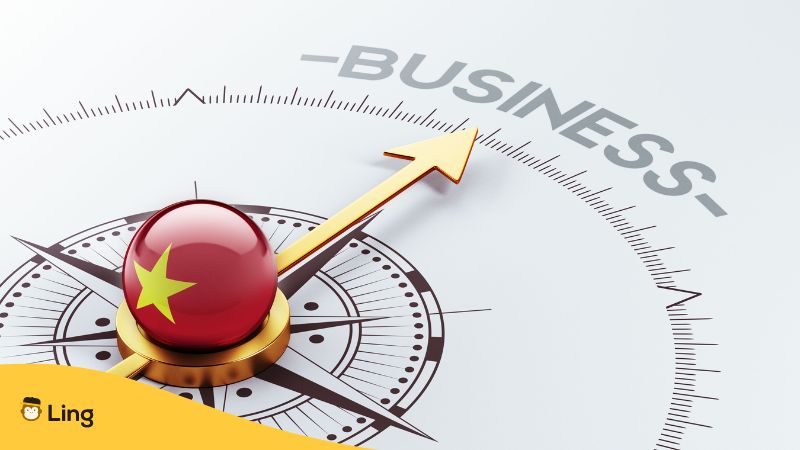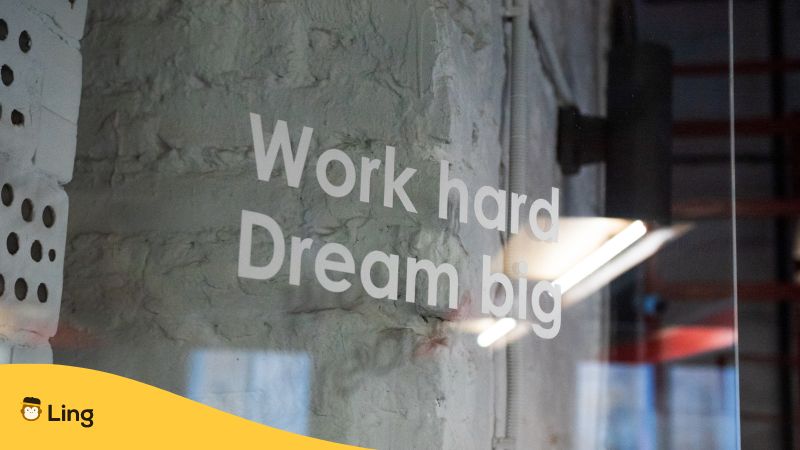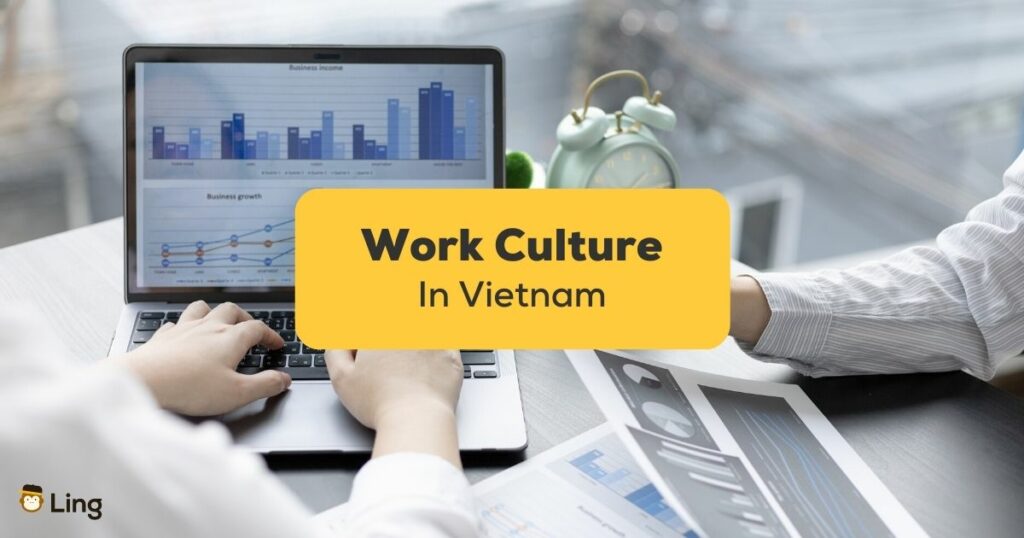Doing business in Vietnam? Or maybe you’re gaining your TEFL certification and will be teaching in Vietnam? It’s a no-brainer why you need to know the work culture of Vietnamese people! You see, business deals and such are of a different breed in this country, and learning all you can about the nuances of culture in business will make all the difference.
From what you need to know about its business etiquette to what to say in a meeting, this guide details all you need to know about the work culture in this beautiful Southeast Asian country. Let’s learn Vietnamese with these facts!
Table of Contents
What Is Working In A Vietnamese Company Like?
Vietnam’s work culture is an intricate blend of tradition and modernity, shaped by a deep respect for hierarchy and authority. The culture values teamwork and collective thinking, which is reflected in the collaborative approach to work. Similar to most Asian countries like Japan, long working hours are the norm, and there’s a strong focus on productivity and delivering results. In fact, meeting targets and deadlines is an essential aspect of the Vietnamese work culture, driving professionals to work with dedication and diligence.
As a writer who used to work for a Vietnamese company, I witnessed firsthand the importance of relationships and social connections in Vietnamese business culture. Personal connections and trust are integral to building successful working relationships with Vietnamese colleagues and clients alike. From the way I see it, the emphasis on interpersonal connections extends beyond just business and often involves social events and bonding activities outside of work.

Work Culture Of Vietnamese People
After spending some time in the country, I learned from the locals that many of the businesses there are family-owned. So this only means one thing: a Vietnamese family plays a vital role in the workplace! That explains why I often felt that the mode of communication in our office often focused on maintaining harmony and avoiding conflict. Due to many businesses being set up with a hierarchical business structure, expect to be fighting your way up to talk to the highest-ranking person in every business meeting.
Before you book a ticket and decide to move to Vietnam, you have to remember that work-life balance in this Asian country can be challenging. Unlike the chill vibe in Australian companies, employees here are almost always working extended hours.
Vietnam’s rich history and culture have influenced its work culture. A culture that values hard work, perseverance, and loyalty to authority has emerged from the country’s past of imperial dynasties, colonization, and communist rule. Dealing with monarchies and authoritarian governments has led to a top-heavy work culture.
According to World Business Culture, “Respect for the hierarchy is deeply ingrained in Vietnamese society and has a direct impact on doing business.” Collectivism and teamwork are essential values, putting the good of the group ahead of individual performance. When dealing with Vietnamese employees, the group’s interest is always put ahead of other issues.

Traditional Vietnamese Work Values
Hard Work And Perseverance
According to a report by Vietnam Briefing, hard work and perseverance are two of the most important words that describe the Vietnamese work culture. This is partly due to the country’s history, which includes imperial dynasties, colonization, and communist rule. As a result, Vietnamese people are known for their strong work ethic, as well as their dedication to education and continuous learning to improve their skills.
Perseverance is also highly valued, as setbacks are seen as opportunities to learn and grow. As a result, working hours have become longer. Vietnam’s work culture and obsession with hard work have contributed to the country’s rapid economic growth, with a thriving middle class and a growing entrepreneurial spirit.
Authority And Hierarchy In Vietnamese Offices
Age, position, and seniority are highly valued in a business, especially in Vietnam. The hierarchical structure is often reflected in the workplace, with the oldest members occupying high positions as business partners, managers, and more. It is common for employees to address their superiors with formal titles and use proper etiquette when communicating with them.
Decision-making is often centralized in Vietnam’s business culture, with senior managers holding significant power and influence. This adherence to authority and hierarchy is rooted in Confucianism, which emphasizes the importance of social order and respect for elders. Therefore, understanding and respecting the hierarchical structure is crucial when doing business in Vietnam or working alongside Vietnamese colleagues.

Vietnamese Employees And Collectivism
Collectivism is deeply rooted in Vietnamese culture and is reflected at work. There is a strong emphasis on teamwork in a Vietnamese office, and individuals are expected to put the group’s goals ahead of their personal ambitions. Foreign businesses may find this hard to deal with, as they will deal with an entire business culture instead of a single individual.
The focus on group harmony and consensus-building can slow down decision-making. The personality traits of each Vietnamese individual may have their conflicts. Still, it also ensures that everyone has a voice and that decisions are made for the collective good. Moreover, this approach is rooted in Confucianism, which emphasizes the importance of social harmony and the interdependence of individuals.
How Do You Say Work Culture In Vietnamese?
The Vietnamese word for work culture is Văn hóa làm việc
If you want to address your boss and coworkers properly, it’s important to know more words and phrases for business.
Words And Phrases About Business Etiquette In Vietnam
Greetings And Introductions For Business Meetings In Vietnam
If you find yourself in a business relationship with a Vietnamese company, having these phrases handy can help you create a good and lasting first impression. Most Vietnamese employees would take better to their business partner greeting them in Vietnamese! Let’s check out these proper Vietnamese business etiquette words and phrases.
Do you want to impress your Vietnamese workmates? Learn Vietnamese vocabulary in a faster and easier approach using the Ling app. You can download it on the Play Store or App Store and try the fun activities while you’re on your way to sound like a native speaker.
Communication Styles For Successful Deals In Vietnam
A direct and aggressive approach should be avoided, as Vietnamese people can perceive it as rude. Instead, use a more indirect and diplomatic communication style while paying attention to nonverbal cues such as facial expressions and body language.
Additionally, getting to know colleagues and clients personally can greatly benefit communication and overall success in the workplace, as building personal relationships and establishing trust are crucial in Vietnamese business culture. Show consideration for hierarchy and seniority, addressing people with the appropriate title and using the proper level of formality when communicating.

Business Attire In Vietnamese Offices
Vietnamese offices tend to be dressed conservatively and formally. Men are expected to wear long sleeve shirts, pants, and dress shoes. In contrast, women are expected to wear modest dresses, skirts, and blouses, especially in a white-collar environment.
It is important not to wear revealing or tight clothes among Vietnamese workers because it may be seen as inappropriate. In addition, it is customary for employees to dress in a manner that reflects their position and the level of seniority they have within the company.
Dress codes can be more relaxed, especially in creative and startup industries. On the other hand, business attire tends to mean different things, especially to young Vietnamese people. To determine the appropriate dress code for a particular workplace, it is always a good idea to check with Vietnamese colleagues or HR.
Challenges And Opportunities Of Working In Vietnam
Dealing With The Language Barrier
Foreign direct investment can be a lucrative opportunity for business expansion in Vietnam. However, when doing business with Vietnamese partners, one may encounter a language barrier. Especially there are at least 110 official Vietnamese languages and dialects that are not the same per Vietnamese region. Vietnamese is the primary language used in business transactions and negotiations. This can make communication and understanding challenging, potentially leading to misunderstandings and errors.
English is not universally understood, especially among older generations, although it is becoming more widely spoken. To overcome this barrier, foreign investors should consider employing local translators or interpreters to facilitate communication and ensure that both parties fully understand the intent and expectations of the other.
In addition, investing in language and cultural training can help you navigate the Vietnamese business landscape and develop stronger relationships with Vietnamese partners. Patience and understanding of language differences can ultimately result in successful FDI projects in Vietnam.

Building Good Business Relationships
Ho Chi Minh City wasn’t built in a day, and neither is a business. For people whose business is their life, building great relationships with employees and important clients is equivalent to their success.
That said, foreigners can create a good rapport with the people they do business with. All it essentially boils down to is respect: the Vietnamese, being a hierarchical and collectivist culture, will expect foreigners to observe the country’s concept of the face: where appearances matter, and respect is expected.
Showing respect for Vietnamese culture and traditions, especially when doing business in the country, will go far for anyone saving face. Vietnamese polite words and phrases are seen as obedience and courtesy to the common folk of Vietnam. Ignoring these customs is considered rude and may not lead to harmony in the workplace. And for people who don’t like waiting, you may lose face if you do not practice being patient and flexible in negotiations.
Frequently Asked Questions About Work Culture In Vietnam
How Is The Work Life In Vietnam?
Most Vietnamese employees say that work-life in Vietnam is significantly challenging. However, many employees nowadays look for ways to protect their work-life balance. Moreover, a fast-paced and an increase in tourism over the last years also made it harder for foreigners to apply for local Vietnamese jobs as it already is before.
The minimum wage allowed in Vietnam is 1,490,000 Vietnamese Dong. Meanwhile, the average salary for local Vietnamese workers is six to seven million dong for workers without higher qualifications like degrees. However, people from universities or with at least good working experience will get ten million dong per month.
What Are The Working Conditions In Vietnam?
According to Vietnamese labor laws, a typical Vietnamese company will have 40 hours or more for full-time working conditions in Vietnam. However, some companies tend to go beyond these normal hours. For example, the working limit for a Vietnamese company is 48 hours, but some go for 56 hours a week.
Many companies have allowances, bonuses, insurance and overtime pay as well.
What Is The Work Attitude Of Vietnamese People?
As mentioned earlier, Vietnamese people are hardworking. They also uphold respect, politeness, and a hierarchy in the workplace. So it’s important for you to know your bosses first and then your workmates. Expect to have long lunches with your coworkers and dinner with alcohol to embody the convivial vibe of the Vietnamese people.
Learn Vietnamese For Business With Ling
Before you start receiving business cards in Vietnam, it is essential to learn a little more about the language of the country. Doing so will get you farther than just knowing xin chao! But how do you do it?
With the Ling app, of course! We provide lessons in Vietnamese and over 60 other languages, with lessons that are created to make learning easy, exciting, and memorable! From words about business to social conversation, this app is what you need!
Take your Vietnamese language skills from zero to hero today with the Ling app. Download it for Android or iPhone today.



































































